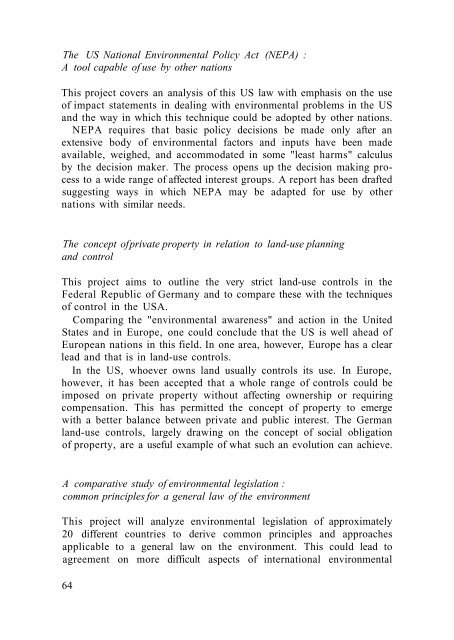1973 iucn yearbook
1973 iucn yearbook
1973 iucn yearbook
Create successful ePaper yourself
Turn your PDF publications into a flip-book with our unique Google optimized e-Paper software.
The US National Environmental Policy Act (NEPA) :<br />
A tool capable of use by other nations<br />
This project covers an analysis of this US law with emphasis on the use<br />
of impact statements in dealing with environmental problems in the US<br />
and the way in which this technique could be adopted by other nations.<br />
NEPA requires that basic policy decisions be made only after an<br />
extensive body of environmental factors and inputs have been made<br />
available, weighed, and accommodated in some "least harms" calculus<br />
by the decision maker. The process opens up the decision making process<br />
to a wide range of affected interest groups. A report has been drafted<br />
suggesting ways in which NEPA may be adapted for use by other<br />
nations with similar needs.<br />
The concept of private property in relation to land-use planning<br />
and control<br />
This project aims to outline the very strict land-use controls in the<br />
Federal Republic of Germany and to compare these with the techniques<br />
of control in the USA.<br />
Comparing the "environmental awareness" and action in the United<br />
States and in Europe, one could conclude that the US is well ahead of<br />
European nations in this field. In one area, however, Europe has a clear<br />
lead and that is in land-use controls.<br />
In the US, whoever owns land usually controls its use. In Europe,<br />
however, it has been accepted that a whole range of controls could be<br />
imposed on private property without affecting ownership or requiring<br />
compensation. This has permitted the concept of property to emerge<br />
with a better balance between private and public interest. The German<br />
land-use controls, largely drawing on the concept of social obligation<br />
of property, are a useful example of what such an evolution can achieve.<br />
A comparative study of environmental legislation :<br />
common principles for a general law of the environment<br />
This project will analyze environmental legislation of approximately<br />
20 different countries to derive common principles and approaches<br />
applicable to a general law on the environment. This could lead to<br />
agreement on more difficult aspects of international environmental<br />
64

















